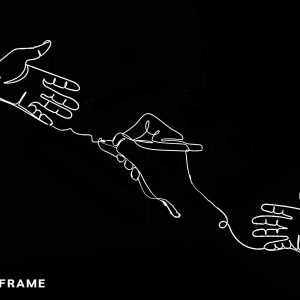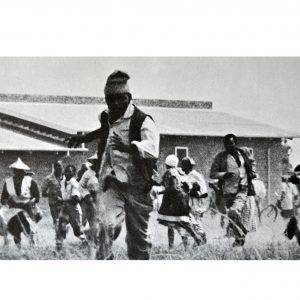Phumlani Pikoli’s world without restriction
The multidisciplinary artist, whose novel was recently longlisted for the prestigious Sunday Times CNA Literary Awards, leaves behind a unique body of work to explore, and an ethos to inspire other…
Author:
11 May 2021

Phumlani Pikoli, who died on 11 April aged 33, described writing as “an obsession”. While musing on his portfolio for the Mail & Guardian, he demonstrated his commitment to his craft through the lyrical quality of his voice. “My stories eat me from the inside out and, by the time I’m sitting down to write any of them, it’s been a long time coming. They start as tiny fractures of glass underfoot, constantly pricking while remaining invisible to the eye. Then they grow into larger chunks, ready to be placed. Often, they’ll haunt my showers, falling through the steamed rivulets and clearing the path for themselves to be written. By the time I get to the desk, it’s already been decided which medium I’ll be writing in.”
The young multidisciplinary artist, rapper, filmmaker, journalist and novelist leaves behind many works created over a short period of time. Pikoli was one of the brightest minds of his generation. His fearless and honest writing describes the postapartheid experience. When asked in an interview what he loves about writing, he said, “That you get to imagine and create worlds without restriction. I think that’s the best part about it.” Through every medium with which he engaged, he explored this world-making.
Related article:
The news of his death sent shockwaves through the South African arts and literary community. Pikoli was warm and funny while being a firm advocate for social justice. The tributes to him bear testament not only to his talent, but also to how he was a beloved friend, collaborator and respected cultural worker.
Born in Zimbabwe to parents in exile, Pikoli later moved with his family to South Africa. His youth was spent walking the streets of Pretoria, experimenting with music, zines, skateboarding and art. Later he moved into theatre, writing and filmmaking – sometimes all at the same time. He created with a feverish, rare energy. He was also interested in sports. Many encountered Pikoli through his brother, artist Lisolomzi, also known as Fuzzy Slippers. The pair were frequent collaborators. Pikoli surrounded himself with writers, artists and musicians.
From dreams to debut
“The second print run would always be overshadowed by the feeling of seeing that first batch of books, once a dream, manifest into reality,” he wrote in the foreword of The Fatuous State of Severity, his first book, published in 2016.
The anthology of short stories was written while in psychiatric care for depression, which Pikoli spoke about openly. Initially self-published, the book deals with mental health, class and race. His dream became reality when Pan Macmillan South Africa published the work. Pikoli later turned the book into a short film and adapted it into a multisensory exhibition in Johannesburg.
His debut novel, Born Freeloaders, followed in 2019. The coming-of-age story about teens born on the cusp of democracy, as Pikoli noted, had not been told before from the perspective of young people in Pretoria. At the time of his death, he was working on a screen adaption of the novel with Kagiso Lediga’s Diprente Films.
In early 2020 he was selected as one of the Mail & Guardian’s Top 200 Young South Africans, and in November, he was awarded the K Sello Duiker Memorial Award at the South African Literary Awards.
Pikoli’s ebullience made those who encountered him feel special – as the words of those whose lives he touched, gathered here, demonstrate.

A unique authorial voice
Andrea Nattrass from Pan Macmillan worked with Pikoli on the publication of both his books. She recalls receiving a self-published collection of short stories from him in May 2017. “As I read the stories, I was immediately struck by his unique authorial voice, which was raw and authentic, and by his knack of catching the reader off guard.”
Describing him as hardworking, she says, “Our conversations ranged from the profound to the silly – often in the space of a few minutes. I will miss his big ideas and dreams and his endearing grin. I have described him elsewhere as a bright light gone too soon, and I regret that we did not have the opportunity to see his literary career develop further as I have no doubt that brilliant new work still lay ahead of him.”

Katlego Tapala, the editor for Born Freeloaders, met Pikoli through his publisher. “His writing was always unexpected. You could never predict where the narrative would go, and it’s amazing how he could express one project over so many formats, constantly reinventing and reinterpreting a single story. Phumlani was incredible at coming up with stories, or telling stories that many wouldn’t bother to tell,” she says.
Abundant close connections
Pikoli had an extensive social circle and cultivated friendships through his many collaborations. Close friend Andile Mbete connected with Pikoli at university over things they both loved, including music, movies and skateboarding. “It was cool to discover another weird Black kid with a similar life story,” he says. “We had that intensity, love and protectiveness that you find in sibling bonds. The unique thing about Phumlani is that he shared that exact status with our entire friendship circle. He had an incredible ability to build close and strong connections with the people he loved.”
About Pikoli’s legacy, Mbete says, “Phumlani’s creative career and life reflected a lot of the blessings and anxieties of middle-class Black kids living in the shadow of the postapartheid South African experiment. He was the spokesperson for many of us and it’s sad to no longer have someone like that in our corner.”
Loving language and hip-hop
Another close friend, Alvhin Adendorff, echoes these sentiments. He met Pikoli as part of the Cape Town music scene. “We bonded over our love for language and hip-hop. I specifically remember us geeking out over the Black Thought’s Funkmaster Flex freestyle and marvelling at its technical prowess and biting cultural commentary.
Related article:
“The most distinctive feature for me about his writing is its honesty and fearlessness. He wrote the way he would speak to you, with an audacity of spirit and with the courage to challenge your views as a reader. In particular, I found Born Freeloaders to be a refreshing and unique take on a particular kind of Black experience that I had not seen reflected anywhere else.
“I will miss his remarkable sense of humour. He had an ability to bring laughter and mirth to topics that could otherwise be depressing or uncomfortable to discuss.”
Kindred spirits
Writer, photographer and filmmaker Tseliso Monaheng met Pikoli while working for online culture platform Mahala. The pair collaborated on various works, one of them a short film about The Fatuous State of Severity, in which people read passages from Pikoli’s book. They also created a music video for Mx Blouses’ song Ukufa.
“He was a great director, a visionary and he had a load of ideas,” Monaheng says. “When we filmed the Mx Blouse video, everything was so detailed. There was no wondering how a certain scene was going to be executed or what the ultimate product is going to look like because he had it down to the tee.”
Monaheng admired Pikoli’s ability “to weave narrative … to show you what is happening”, rather than to tell, which he attributes to Pikoli’s background as a theatre practitioner. “I’ll remember him for being a truth speaker and not being one of those people who turns weird when you’re honest with them,” Monaheng adds. “We had a lot of honest exchanges between us. I’d like him to be remembered as someone who really cared about his people.”
Creating intimacy
Filmmaker Lebo Rasethaba bonded with Pikoli over their love for film. “Phumlani knew how to escalate intimacy. I can’t remember the moment I met him but I remember the feeling he gave me whenever we hung out, like I had known him my whole life. We worked together on my films. We developed a few script ideas. We sent millions of WhatsApps.” He remembers Pikoli “always pushed me to be honest and reminded me that being cool wasn’t important”.

About his approach to filmmaking, Rasethaba says: “Phumlani exuded a natural brilliance and, in a sense, it made him insecure. He didn’t know how to quite deal with it. In a film I directed, he appeared and spoke brilliantly and naturally about a difficult topic. He forgot to be shy about being great”.
Speaking about his writing, he adds: “He was a rare talent – incisive commentary, funny, witty and charming. There was darkness; there was beauty. His work was packed full of everything the sun touches.”
Kind, inquisitive, restless
Journalist and editor Katy Katopodis worked with Pikoli while they were both at Eyewitness News, when he joined their online team. “He immediately struck me as a kind, inquisitive … restless soul who wanted to tell stories and also to push boundaries,” she says.
Later the pair crossed paths again when the author approached Katopodis to interview him at his launch for Born Freeloaders. “I was beyond honoured because I love Phumlani as a writer. To be able to go on that journey with him in front of an audience, where we were able to interrogate his thinking, his characters, his plot and the pure essence of the book was amazing.
“I’m deeply saddened that the world has lost such a powerful literary voice, such a beautiful heart and a beautiful storyteller. I can say with absolute certainty that Phumlani Pikoli left a huge impact on South African media and literature. His legacy will be one that we can find in his books, in his storytelling, in his journalism… and he will definitely be missed by so many.”
Creativity through connection
Writer and friend Megan Ross met Pikoli when they appeared on a panel together in 2019. Her first impression of him was that he exuded warmth. As writers, they would share first drafts and provide feedback and criticism of each others’ work. “Every conversation with him felt like you were building something … and you always knew that it could turn into an exhibition, a short film, a series of illustrations or a book,” she says.
“I think his fearlessness and taking ideas forward is something we can all learn from. His wanton disregard for rules. Each project of his was like a cat with nine lives, it just lived on and on. He was just able to sit and create these things and put them out into the world. And he did it for all of us.”
Related article:
One of his defining qualities was helping to bring to fruition the work of friends and fellow artists. “He wanted everyone to collide and he just created this amazing mosaic of people … I think his enduring legacy will be his desire for connecting people and bringing people from multiple disciplines together, to create something new.”
Adendorff echoed this after Pikoli’s memorial. “While listening to so many people talk about how Phumlani was planting seeds with them and pushing them to express their creativity, something occurred to me. He had a distinct voice, yes, but what he was building at the same time was a choir … He wanted a chorus of voices ringing out with him in harmony. He had found his voice but subtly he was nudging so many of us to find ours and join him in expressing ourselves to the fullest. My feeling is that he left the notes for us, he left us our parts, he left us his song. It is up to us to find our voices and sing. We may find some solace in that. I know I do.”



